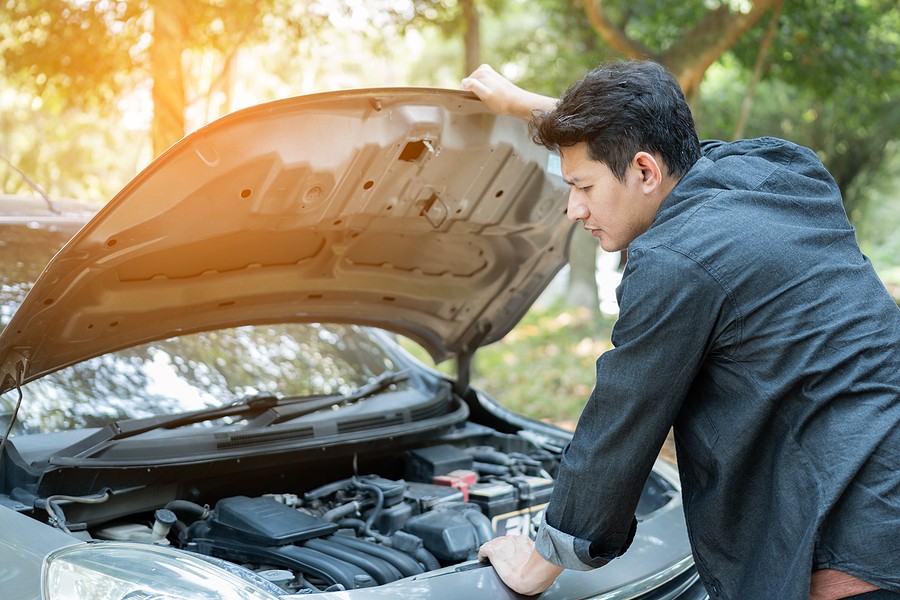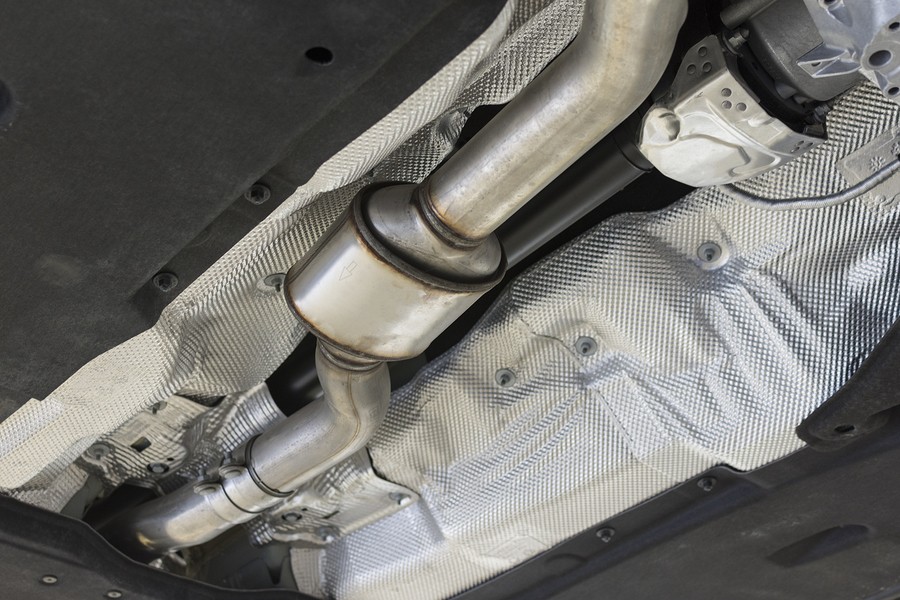When you get a new car, one of the first things you may do is take it in for a tune-up. During this tune-up, the mechanic may find that your catalytic converter is bad and needs to be replaced. But will a bad catalytic converter ruin your engine?
The answer to this question is not so simple. In some cases, a bad catalytic converter can cause serious damage to your engine, while it may not have any effect at all in other cases. If you are concerned that your catalytic converter may be bad, it is best to take your car to a mechanic for diagnosis.
In this article, you'll learn about catalytic converters, what they do, how they work, and why they sometimes fail. You'll also learn some tips on how to protect your car's catalytic converter from damage. But, more importantly, the article will help you answer the question “Will a Bad Catalytic Converter Ruin My Engine?”

What is a catalytic converter, and what does it do?
A car's catalytic converter is an emission control device mandated by the US government in 1975. Its main job is to reduce harmful emissions from vehicle exhaust. The process involves quickly burning up unburned gases and chemicals released into the air when gasoline or diesel fuel combusts inside your engine. Catalytically, or through a catalytic process, converting these chemicals for safe release into the environment helps keep our cities clean and breathable.
If you neglect replacing deteriorated hoses, clamps, gaskets, etc., of your catalytic converter promptly, you will notice that your MPG rate goes down suddenly. This is because the extra chemicals released in the form of emissions through your exhaust system will wear down engine parts like valves, spark plugs, etc., which are not designed to work with these extra chemicals.
Why does a catalytic converter sometimes fail?
A car's catalytic converter will not last forever. It can decay or rust for various reasons, including poor manufacturing material, lack of maintenance, flooding of your car, extreme temperature changes, age of your vehicle, often more than six years old, and so on.
If you fail to maintain your catalytic converter by replacing deteriorated components such as deteriorated hoses, clamps, worn-out gaskets, etc., your vehicle will not be able to run effectively.
This is because the unburned gases that are supposed to be burned by the catalytic converters build up inside your engine and exhaust system. These extra chemicals cause the internal engine parts to overwork like valve stems, rings, valves, etc.
They also burn down fuel more than usual, resulting in a lower rate of MPG (Miles per Gallon). In addition to this, wear and tear due to higher emission standards can make a car's catalytic converter appear bad even it is good. For instance, a 2007 model car's catalytic converter will not produce as much emission as a 1990 model car.

How to protect my catalytic converter from damage?
Your catalytic converter works best and lasts the longest when used under normal running conditions and if you follow manufacturer-recommended maintenance.
To keep your catalytic converter in good shape, change the engine oil on time and use the proper grade of oil recommended by the vehicle manufacturers. Also, keep an eye on hoses, clamps, gaskets, etc., for wear and tear during regular check-ups of your car at professional mechanics or garages & replace these parts as soon as they show any signs of deterioration.
What happens when I ignore my catalytic converter?
If you neglect replacing deteriorated hoses, clamps, gaskets, etc., of your catalytic converter promptly, you will notice that your MPG rate goes down suddenly. This is because the extra chemicals released in the form of emissions through your exhaust system will wear down engine parts like valves, spark plugs, etc., which are not designed to work with these extra chemicals. As a result, your car might have to go into the shop for repairs more often than usual, or you may have to pay expensive bills to replace damaged engine parts.
10 Signs that your catalytic converter needs to be replaced
When the catalytic converter goes bad, your vehicle will grab your attention by showing you some common symptoms of a bad catalytic converter. Let's take a closer look at these symptoms:
1) It isn't easy to start your car
This may be due to several reasons, but if you notice it, especially after driving for a longer distance and then stopping the vehicle, there is a possibility that your catalytic converter has been burnt out. If you find this repeatedly happening, better take your car to a mechanic as soon as possible.
2) Engine backfires
If your engine is misfiring or backfiring, it is a clear sign that your catalytic converter has been damaged. However, don't wait for further damage because the increased pressure in your cylinder head might break open the piston rings creating further problems. Instead, have your car checked by an expert immediately.
3) Poor fuel economy
If you find yourself filling up gas more frequently than usual or not finding any improvement in MPG even after driving for miles on roads with good conditions, the chances are that something is wrong with the catalytic converter of your car.
4) Your engine overheats
An incinerated catalytic converter will result in a high temperature inside the engine due to less oxygen. This will result in a high temperature inside your engine, and it may reach a point where it shuts off automatically, leading to a total breakdown of the car.
5) Your car's performance goes down
If you find that your car is feeling sluggish or slow even after doing all regular maintenance work that might have otherwise boosted its performance, it is a clear indication that your catalytic converter has been destroyed and must be replaced as soon as possible.
6) Smoky exhaust
A smoky exhaust means that unburned fuel has either affected or clogged up your catalytic converter completely. This will lead to low MPG once again and further damage to other internal parts of the engine like valves, etc., which are not designed to work with the extra chemicals resulting from this problem.
7) You find brown or black soot
This is another sign of a clogged-up catalytic converter which will affect your car's performance again. If you take your car for regular tune-ups, you can get it cleaned up at garages, but if you have neglected your car, the only option available will be replacing the corroded part rather than cleaning it up.
8) Your mechanic says it needs to be replaced
There is no other better way to know that your catalytic converter needs to be changed to boost the performance and efficiency of your vehicle. However, if you still notice any of these signs despite having taken care of accessories like hoses & clamps, your mechanic might suggest a replacement due to extensive damage.

9) You notice a change in the color of the exhaust
If you find that the color of the smoke coming out from your exhaust has changed from what it used to be before, it can also indicate a problem with the catalytic converter. Misfiring engines mainly cause a dark grey or black smoke with an intensely strong smell, and when this happens, one must immediately take their car for servicing.
10) Lesser life of engine parts
As mentioned earlier, chemicals released through your engine will wear down engine parts that are not designed to work with these extra chemicals. This will result in a lesser life of spark plugs and valves, so ensure timely servicing and avoid driving long distances on roads with less traffic to prevent damage.
How much will it cost to replace a catalytic converter?
On average, the total cost of replacing your catalytic converter will range between $1,100 and $2,200. This price includes labor costs for installation plus parts. A
A used catalytic converter may be cheaper than a brand-new one, so you might want to check with a salvage yard for a replacement.
A price range is given because many factors will affect the total price. For example, if your vehicle requires extra work because the catalytic converter is not the only part that needs to be repaired or replaced, you can expect the total cost to be higher. On the other hand, if your catalytic converter is in better shape and only needs to be cleaned, you can expect the total price to be lower.
Can I install a new catalytic converter myself?
It is important to remember that you should never attempt to replace your catalytic converter. The chemicals inside are very dangerous, and you should not be exposed to them. These chemicals can cause serious health problems and even death if inhaled or touched. The only way to properly replace a catalytic converter is to have a professional do it for you.

Alternatives to replacing your catalytic converter
If you are trying to figure out how to get your catalytic converter fixed or replaced, two alternatives may be available. The first option is to try and get a replacement catalytic converter from a salvage yard. And the second option is to check with oil change places.
Salvage yards
You can search the Internet for places that sell used parts or ask your mechanic where he gets his replacements. Just make sure to get a guarantee with the catalytic converter that it will work properly on your vehicle and that it is not defective in any way.
Oil change places
You can also get a replacement catalytic converter from an oil change place where they repair catalytic converters on site. You can call around to many oil change places in your area and ask them how much they charge for catalytic converter replacement. Depending on how busy they are, this may save you some money because the labor is usually much cheaper than having it done at a mechanic shop.
If you try either of these alternatives, ensure you get your car inspected again after the replacement to ensure it is running properly. You should also get a guarantee with the part so that if it malfunctions, you can return it and get your money back.
Catalytic converter FQAs
This section will cover some of the frequently asked questions about catalytic converters.
What happens if you drive with a bad catalytic converter?
Driving with a defective catalytic converter will eventually ruin your engine. The extra chemicals released through your car's exhaust will damage the insides of your engine. Your spark plugs will become worn down, and your valves will need to be replaced. Your engine will eventually break down if you continue to drive with a bad catalytic converter.
What happens if you don't replace a catalytic converter?
If you do not replace a defective catalytic converter, it will continue to damage your engine. On average, a bad catalytic converter will reduce your car's fuel economy by up to 40%. This is because the engine has to work harder to process the chemicals through your exhaust. The engine will also lose power and eventually give out. If you do not fix your catalytic converter, it will destroy your engine and leave you stranded on the side of the road.
Is it worth fixing a catalytic converter?
It is almost always worth replacing if you have a bad catalytic converter. Even if your car runs fine with the defective catalytic converter, it is still slowly causing damage to your engine. Eventually, you will need to replace your engine if you do not fix the catalytic converter. Replacing a catalytic converter is usually much cheaper than replacing an engine.
Is it OK to drive without a catalytic converter?
No, it is not safe to drive your car without a catalytic converter. This is because the chemicals released into the air through your car's exhaust can cause health problems and even death. A catalytic converter is designed to help protect the air we breathe by recycling harmful engine chemicals. Without this important part, all harmful chemicals from your engine's exhaust will go directly into the air.
Can I replace my catalytic converter with a straight pipe?
It is never advisable to replace your catalytic converter with a straight pipe. This can be extremely dangerous for you and the environment. Without a catalytic converter, your car's engine will release dangerous chemicals into the air. This can cause respiratory problems for you and others around you and harm to the environment.
How do you fix a catalytic converter without replacing it?
It is highly recommended that you replace a bad catalytic converter. If you cannot afford to fix it right away, take your car in for an inspection. Once the inspector gives you an estimate, you should work out a payment plan with your mechanic. If that does not work for you, try finding a cheaper mechanic. Call around to many different places and get quotes before going with a particular mechanic. If you still cannot get the job done, you will need to get a new catalytic converter.
Can I unclog my catalytic converter?
Some people attempt to unclog their catalytic converter by pouring a can of Coca-Cola into the exhaust. This will not work and is potentially dangerous. All you will do is waste money and pollute the environment.
What are the symptoms of a clogged catalytic converter?
The most common symptom of a bad catalytic converter is the loss of engine power. The engine will lose acceleration and may even stall out while driving. It is probably your catalytic converter if you hear a loud rattling sound coming from under the hood. You may even notice that your car starts to run worse in warm weather. This is because if you have a bad catalytic converter, all of the harmful chemicals from your car's exhaust will be pumped into the air when it gets warm out.
Does premium gas clean catalytic converter?
No, premium gas does not clean a catalytic converter. It is important to have the correct gas type for your car's engine. If you put the wrong kind of fuel into your engine, you could do serious damage. If you have to choose between regular and premium gas, always go with premium. You should also use a fuel injector cleaner about once every other gas fill-up to keep your engine running smoothly.
Conclusion
Catalytic converters are an important part of your vehicle, and if they malfunction, you might find that your car will not function properly. The catalytic converter helps keep the chemicals in your engine from escaping into the environment, so it is essential for maintaining a clean environment and reducing emissions.
If you notice any changes with your exhaust smoke or color, get them checked out right away by a professional! It's also worth noting that many mechanics may recommend replacing the catalytic converter due to extensive damage before trying other options such as getting one from a salvage yard or oil change place because these can save money on labor costs while still providing quality parts.
Do some research online about how much different replacement catalytic converters cost to make sure you make an informed decision when you get yours replaced.




